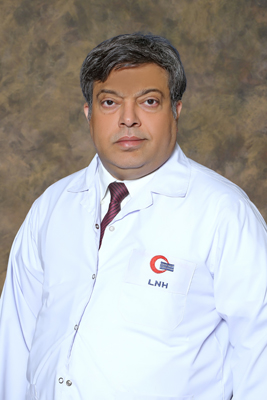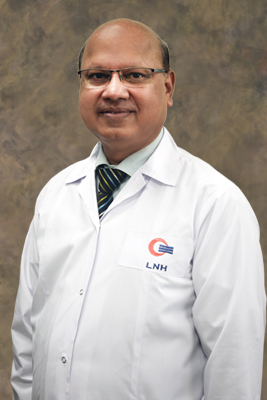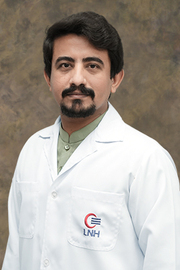Neonatology unit provides comprehensive care to the critically-ill newborns in the neonatal intensive care unit. The spectrum of this field also includes the care of well babies in the postnatal ward. Antenatal counseling of high risk pregnancies is a salient feature of this highly demanding field of Paediatric medicine. The need of specialized neonatal care units is increasing in number with emergence of premature deliveries in the last few decades.
The Neonatology service at LNH aims at providing high quality care to preterm and term neonates, including those needing integrated critical management. There are support services for complete neonatal management including; Paediatric Cardiology, Paediatric surgery, Genetics and Metabolics, and Paediatric Neurology. The neonatology team involves expert and experienced faculty members of the field. The service gets referrals from all over the country.
Neonatologist also plays a role in counseling of families in the antenatal and postnatal period regarding management of current illness, prognosis of illness and genetic issues. Whilst providing team leadership, clinical and skills training, the neonatologist is also expected to be able to perform challenging technical procedures.
Long-term follow-up with developmental screening until two years of age is also the role of a neonatologist. It is the combination of intensive care skills, ethical and emotional support, and clinical follow-up that make this a unique specialty.
Services
Neonatology Service is a comprehensive service that encompasses routine and emergency care of preterm neonates, with issues like Respiratory distress syndrome, need of mechanical ventilation, Intraventricular Hemorrhage, Necrotizing enterocolitis, Patent ductus arteriosus (PDA), sepsis, feeding difficulties, Persistent Pulmonary Hypertension and prolong hospital stay. It also offers management of many neonatal surgical conditions, including Congenital diaphragmatic hernia, tracheoesophageal fistula, an intestinal Artesia, cardiology cyanotic congenital cardiac diseases, Patent ductus arteriosus (PDA) etc.
At LNH, neonatologists also provide outpatient services to all babies discharged from NICU, Neonatal HDU and Well baby ward. The follow up includes anthropometric (Growth) and developmental assessment directly by the neonatologist. Neonatal OPD also guides the parents for vaccination of a neonate. Neonatologist also advices for circumcision in case of eligibility.
Specialized services offered by this specialty include:
- Critical Preterm care: Neonatology unit deals with extreme preterm babies (less than 28 weeks) and extremely low birth weight babies (less than 1kg). The ventilator strategies are specific and can be dealt by trained neonatologists only.
- Management of neonatal diseases and comorbidities according to international standardized protocols.
- Invasive procedures like Tracheal Intubation, Umbilical catheterization and peripherally Inserted central catheter (PICC).
- Retinopathy of prematurity (ROP) screening by Paediatric ophthalmologist.
- Neonatal hearing screening.
- Non-invasive diagnostics: Point of care ultrasound Head, point of care ECHO and departmental CT and MRI are also performed under strict neonatology supervision.
There is a closed loop system with Obstetrics and Gynaecology and Neonatology team for management of high risk cases. This includes antenatal counseling of all high risk pregnancies by Obstetrician and neonatologist. It helps in better postnatal management and outcome of such cases.
We have expertise in dealing with extremely premature babies, with Paediatric cardiology cases, and also have Geneticist and Paediatric surgeons on board.
Frequently Asked Questions
Babies born before 37 weeks of gestation.
Respiratory distress syndrome, need of mechanical ventilation, Intraventricular Hemorrhage, Necrotizing enterocolitis, Patent ductus arteriosus, sepsis, feeding difficulties, Persistent Pulmonary Hypertension and prolong hospital stay.
It depends on clinical condition of the baby. Usually, preterm babies have a prolonged NICU stay.
Once the baby is clinically stable, on minimal oxygen support and tolerating at least 70% of the target feeds.
That depends on overall course of illness. Growth and development needs to be followed over time.
Yes, genetic conditions can effect subsequent pregnancies.
Check anthropometric (Growth) measurements serially.
Faculty



Contact
Please call us on 021-34412474.

